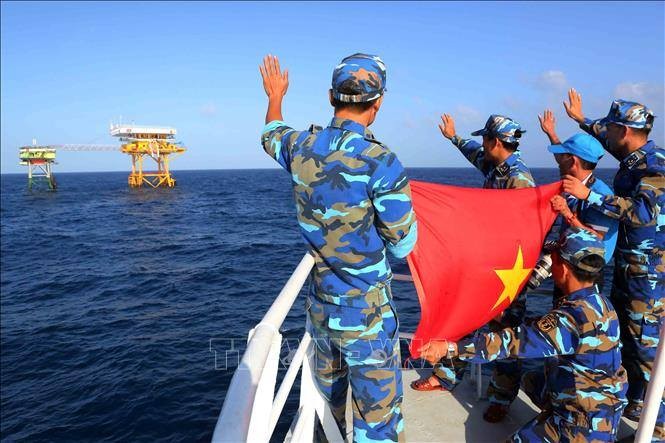(VOVWORLD) - Chinese geological survey vessel group Haiyang Dizhi 8 has recently violated Vietnam’s Exclusive Economic Zone (EEZ) and continental shelf in the south of the East Sea. China’s move, which has caught attention of the international public, has seriously violated international law, including the 1982 United Nations Convention on the Law of the Sea, and directly threatened regional and global peace and stability. Being a responsible member of the UN, Vietnam has been persistent to resolving disputes and conflicts in the East Sea by peaceful means.
 A delegation of the Maritime Zone 2 visits soldiers on DK1/12 platform, a sovereign outpost on Vietnam's continental shelf. A delegation of the Maritime Zone 2 visits soldiers on DK1/12 platform, a sovereign outpost on Vietnam's continental shelf. |
The Tu Chinh Reef Bank or Vanguard Bank is located within Vietnam’s exclusive economic zone 200 nautical miles from its baseline, which is defined by the 1982 UN Convention on the Law of the Sea.
Chinese action seriously violates international law
Article 56 of the 1982 UNCLOS says in their economic zone, coastal states enjoy sovereign rights over the natural resources, whether living or non-living, of the waters overlying the seabed and of the seabed and its subsoil, and other activities like energy production from water, currents or winds.
Therefore, any activity by foreign countries in Vietnam’s waters must be conducted in line with regulations of the 1982 UNCLOS and Vietnamese law. Actions not allowed by Vietnam are violations of the country’s waters, international law, and the 1982 UNCLOS.
Regardless of international law, China has irrationally asked Vietnam to stop exploring oil and gas fields in the waters where Vietnam holds sovereignty and sovereign rights.
Noah Zaring, Political Counselor at the US Embassy in Vietnam, said that visibly, China is intentionally using force to serve its purposes. China has destabilized the situation and used power to bully other countries. China should cooperate with and respect international law and not harm regional countries’ sovereignty and trust, Noah said.
China has intentionally accused Vietnam of “unilaterally” conducting oil and gas exploration in Vietnam’s exclusive economic zone, attempted to turn Vietnam’s sovereign waters into disputed sea, imposed a situation of “power belongs to strongmen”, and attempted to exercise hegemony over the East Sea.
Umnova Irina Anatolyevna, Dean of the Russian State University of Justice’s Faculty of Constitution and Law Research under the Supreme Court of Russia, said that China's activities go against the 1982 UNCLOS and ASEAN countries' efforts to protect peace and resolve disputes by peaceful means. These activities are not allowed to repeat. She said that Vietnam should insist on its stance to resolve disputes by peaceful means and oppose the use of force.
Vietnam respects international law, resolutely defends sovereignty
Vietnam pursues a consistent policy of resolving conflicts and disputes in the East Sea by peaceful solutions with the spirit of partnership and responsibility for the community, based on international law, without using force or threatening to use force.
Vietnam has contacted the Chinese side many times via different channels, handed over protest diplomatic notes and demanded China immediately withdraw all of its vessels from Vietnam’s waters and respect Vietnam’s sovereign right and jurisdiction.
Relevant Vietnamese forces at sea have continued to perform legal, prompt activities to peacefully exercise Vietnam’s sovereignty, sovereign right and jurisdiction to defend Vietnam’s waters.
Professor, Doctor Pham Quang Minh, Dean of the University of Social Sciences and Humanity, said: “In a world of globalization and interdependence, states, even big ones, cannot detach themselves from the global trend. Vietnam will lobby for the international community and use its diplomatic influence to peacefully resolve disputes. Diplomacy is a sharp tool to make the world understand better Vietnam, share Vietnam’s values and viewpoints to handle disputes peacefully without use of force or threat to use force. They are Vietnam’s consistent principles and it’s time to use diplomacy to defend national sovereignty.”
Vietnam’s correct approach has created prestige and soft power for the country to defend its sea and island sovereignty. Vietnam’s compliance with international law, respect for transparency in resolving disputes, and cooperative manner have been supported by the international community and contributed to regional and global peace, stability, and development.